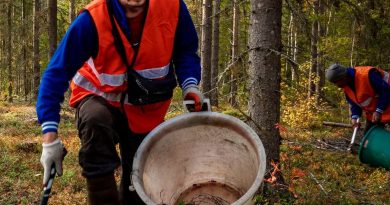Alaska: Could permanent fund be used for investment in gas export project?

JUNEAU — Alaska may have an opportunity for a potentially risky but very profitable investment when it comes to decision time on a liquefied natural gas export project.
But budget deficits are eating into Alaska’s readily available savings, and there may not be much other than the Alaska Permanent Fund left when it comes time to make those multibillion-dollar investments.
So should the Permanent Fund consider investing some of its $50 billion portfolio in a pipeline project?
Former Gov. Frank Murkowski renewed that years-old discussion with columns in Alaska newspapers last spring. A letter Murkowski later sent to Permanent Fund leaders urging consideration of the idea has been discussed at recent meetings. It found both support and criticism.
No decision yet
No decision had yet been made on whether to build a natural gas pipeline, but the Alaska Legislature this year approved new studies to help Alaska and partners ConocoPhillips, Exxon Mobil, BP and TransCanada decide whether it makes sense.
One of Murkowski’s concerns is that under recently passed Senate Bill 138, TransCanada will be involved in the project even though it is the only partner that doesn’t hold rights to natural gas but will earn profits that could go to Alaska.
“Alaska citizens, not TransCanada, should enjoy the economic benefits produced by the project,” Murkowski said in his letter to the fund.
The former governor wants the Permanent Fund to study investing in the pipeline project itself.
Trustee Carl Brady brought the Murkowski proposal to the board.
“He made, for many, a compelling argument,” Brady said.
Brady was appointed to the Permanent Fund Board of Trustees by Murkowski in 2003 but was not reappointed by Gov. Sarah Palin. In 2011, Gov. Sean Parnell again appointed Brady to the board. He also served in the 1990s and has extensive knowledge of Permanent Fund history.
Board Chair Bill Moran urged members to avoid any quick action on the proposal and said the board needed to educate itself on the issue because of its statewide importance.
Oil and gas investment
The Permanent Fund has recently begun making direct investments in the oil and gas business through two private equity firms, but all those investments have been in the Lower 48 or overseas.
At a recent meeting of the Board of Trustees, outside investment adviser George Zinn questioned David Rubenstein, managing director of one of those private equity funds, The Carlyle Group, about the wisdom of investing in the Alaska natural gas pipeline. (Rubenstein is the husband of Alaska Dispatch News publisher and owner Alice Rogoff.)
The billionaire financier warned of the risks of investing state money so close to home and said the politics of Alaska are even more complicated than those of Washington, D.C.
“I just don’t know whether the economic upside is worth the political risk,” Rubenstein said, but he cautioned that he wasn’t familiar with the project’s merits.
The Permanent Fund several years ago delved into the issue of pipeline investing and whether it could legally make such an investment, Brady said.
The fund was initially limited by law to bonds and other very safe investments, but over the years those limits have gradually been lifted. Mike Burns, executive director of the fund, said it is now under what’s known as the “prudent man” rule and can invest in anything a prudent man would consider proper.
That’s opened up investment options well beyond bonds to U.S. stock, foreign stocks, real estate, private equity and hedge funds.
The previous legal opinion found that under the “prudent man” rule a pipeline investment would be allowed, Brady said.
Looking ahead
Adviser Zinn said after the board’s September meeting that what Rubenstein said was noteworthy.
“He thought it would be a very bad idea for the Permanent Fund,” Zinn said.
Zinn is corporate vice president and treasurer of Microsoft Corp. and one of three investment experts who help advise the board.
But fund director Burns said the fund would likely not consider such an investment on its own, despite Murkowski’s letter.
“We appreciate Frank’s interest,” Burns said, but without a request from the Legislature or the Parnell administration action, Permanent Fund action on the proposal is unlikely.
Department of Revenue Commissioner Angela Rodell, who also serves as a trustee, said the state was studying financing options as required by Senate Bill 138.
It will produce a report on options, risks and impact to the state’s credit rating for various financing alternatives early next year.
Permanent fund staff expertise will likely be sought to help prepare those reports, Rodell said.
Related stories from around the North:
Canada: Canada ponders exceptions to relief well rule for Arctic oil drilling, Alaska Dispatch
Norway: No Norwegian services to Russian Arctic offshore oil, Barents Observer
Russia: In time of sanctions, Prirazlomnaya seeks Russian suppliers, Barents Observer
United States: Shell’s new Chukchi plan: Two rigs drilling wells at the same time, Alaska Dispatch



